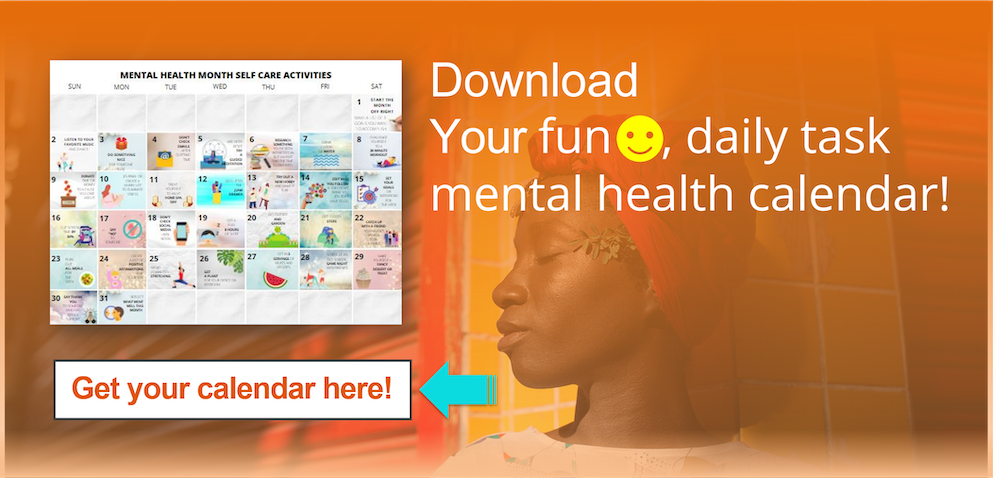Mental Health isn't a Mind Thing; It's a Whole Person Thing
When you get sick, you go to the doctor. (S)he does a physical exam, runs some tests, asks some questions and tells you what's wrong and how to get better.
If you think you may be suffering from anxiety, depression, stress-induced mania, grief, or some other emotional issue, where do you? Who do you see? How do you get better? You or a loved one could be suffering from PTSD, or substance abuse, psychosis, or bipolar disorder, but are you? It is important to find out because a diagnosis tells a professional the best way to help you get better.
Many, many people suck it up and try to live with their fear, sadness, and stress, not realizing there is another option. Living in a constant state of turmoil or unhappiness doesn't just make your mood sick. It makes your body sick, too.
There is scientific evidence that mental illness is associated with an increased occurrence of chronic diseases, such as cardiovascular disease, diabetes and cancer. Yet, very few people screen their mental health and end up living with both mental and then physical illness.
"Until you make the unconscious conscious, it will direct
your life, and you will call it fate." — Carl Jung
You take care of your body, your eyes and your teeth without question. Why not add yearly mental health screening to your preventative care routine? Most people don't because they think friends, family, peers or their boss will pass judgment. Unstable, crazy, cuckoo, not right in the head; these are all terms the current population has grown up hearing.
Stigmas associated with mental health problems are getting better. Still, most people are not yet willing to take the chance that they will somehow be negatively impacted if they are given a diagnosis.
Interestingly, the younger population is becoming increasingly aware of how their mental well-being can impact every facet of their lives. According to Mental Health America (MHA), mental health concerns are concentrated among younger people, with 64% being under 25.
The stigma associated with mental health is beginning to shift. But, until access to mental health care improves, it's unlikely this generation will receive the support and care needed for long-term change.
Including mental health in the healthcare system would vastly change the conversation around mental illness, what it is, and what it is not. Having accessible services and normalizing mental health screenings would change the lives of many people who are too afraid to seek help or those who do not have access to care.
Until that time comes, it is up to you to be your own best advocate. Take your mental health seriously and do an annual screening.
What is mental health?
According to the World Health Organization, mental health is "a state of well-being in which an individual realizes his or her own abilities, can cope with the normal stresses of life, can work productively and is able to make a contribution to his or her community."
Checking in on Yourself – Mental Health Screening
Have you ever sat down at the end of a bad day and thought, "I can't do this anymore," or panicked because you think you lost your phone?
Most of you have experienced depression or anxiety at some point in your life. Maybe you are running late to the airport, maybe you have to give a speech in front of a crowd of people, maybe there's been a death in your family, and the sadness is overwhelming.
Anxiety, sadness, mild depression, are all within the normal scope of human experience. Once the situation has is resolved, your reactions and emotions return to a normal state. If you are suffering from an anxiety disorder, those feelings of anxiety are present whether you are dealing with a stressful situation or not.
However, if you are concerned about your mental health or the mental health of someone you love, there are now free online screening tools and assessments that can help you discern whether you have an illness and how to treat it.
These tools support you at a vulnerable time when intervention has the best chance to build resiliency and avert a crisis.
And please, please, please don't forget to promote the use of your organization’s Employee Assistant Program within your workplace. At Ulliance, we offer several well-being assessment quizzes for individuals to take at anytime, on demand, in our well-being portal.

What is a mental health screening?
A mental health screening is a way for you to take stock of your emotional health. It helps you identify a mental health disorder that, when identified early, leads to better intervention and positive outcomes.
Screenings are private, cost-free and easily accessible, and they can save you from years of suffering.
Assessing your risk factors, which can be behavioral, genetic, or environmental, will help determine if you need treatment, whether you would benefit from minimal intervention, or if you need further diagnostic assessment and treatment.
Mental health screening detects the most common diagnoses such as depression, anxiety, eating disorders and PTSD, which are often symptoms of an underlying problem that require extra attention. With accurate mental health knowledge in hand, you can seek help that works best for you.
No one can know your true mindset unless you are truthful about it. When you do the screening, be honest when answering the questions.
The goal is to empower yourself with knowledge and take action. Whether you're having a bad day, a bad week, or you have a mental illness, with a bit of help, you'll get through it and go on to live your best life.
When you partner with Ulliance, our Life Advisor Consultants are always just a phone call away to teach ways to enhance your work/life balance and increase your happiness. The Ulliance Life Advisor Employee Assistance Program can help employees and employers come closer to a state of total well-being.
References
About MHA Screening. (n.d.). Retrieved from Mental Health America: https://mhanational.org/about-mha-screening#MHAScreeningforOrganizationsandDirectSupport
Jeffrey Borenstein, M. (2020, August). Stigma, Prejudice and Discrimination Against People with Mental Illness. Retrieved from American Psychiatric Associaton: https://www.psychiatry.org/patients-families/stigma-and-discrimination
Nunez, T. (2020, October 1). Mental Health Screenings: The Importance of Checking-In. Retrieved from ketamine health center: https://ketaminehealthcenters.com/blog/mental-health-screenings/
Spector, N. (2018, January 22). Why don't Americans get regular mental health checkups? It's complicated. Retrieved from Better by Today: https://www.nbcnews.com/better/health/why-aren-t-mental-health-screenings-part-our-annual-physicals-ncna839226


